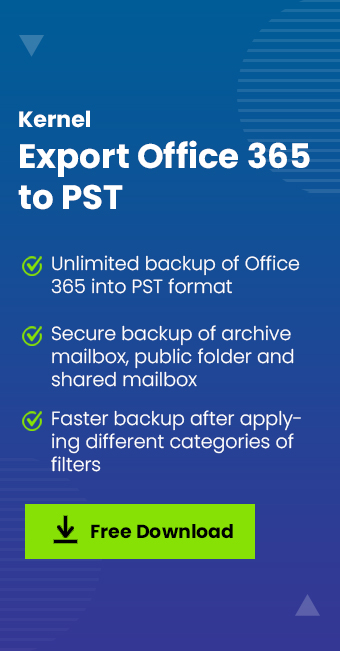Read time 4 minutes
The General Data Protection Regulation (GDPR) is a regulation by the European Union (EU) that provides a clear mandate for handling the personal data of all EU citizens for all the businesses that sell and provide services or employes citizens. Since its introduction, it has been an active part of every discussion amongst all types of companies. However, for a small-scaled company, this regulation must be overwhelming. Businesses operating over Office 365 already executes certain data protection activities such as data export, import, migration & offline backup. This article is there to help you understand the GDPR law’s nitty-gritty and how you can manage the requirements of GDPR compliance and Office 365 backup in your business.
What is GDPR compliance?
Many people consider GDPR as the law that will keep data secured. It is necessary to secure your customer’s data from misuse by those who do not even intend to see that private data and could have malicious intent to manipulate data for some bigger disaster. Some organizations are, however, confused regarding the GDPR set of instructions. They have every reason to be worried about it because failure to comply with the GDPR law will be costly as they could be fined up to 4% of annual global turnover or €20 Million.
By countering the worst case, data breaches happen, and sensitive data gets stolen, lost, or handed to the wrong people without considering the risk factors, which could severely affect the whole nation. To take control over this condition, the EU Commission regulated this law to secure the data of EU Citizens. All companies and organizations that collect the data and those who process it will have to restructure their systems per GDPR law.
Factors of GDPR compliance and Office 365 backup
The organizations having EU users are obliged to protect their user’s data and keep it safe from exploitation. Any organization or service provider failing to obey the rule will face heavy penalties and also face various repercussions if client’s data is lost & misused.
This law clarified that the user’s consent is critical to GDPR Compliance. Organizations are not supposed to add lengthy terms and conditions legalizing the authority to use their data which users accept to avail of the free services without knowing the hazardous effects this agreement could cause.
The primary data subject rights mentioned in the law are described below as crucial factors for GDPR compliance.
- Breach notification
Breach notification will become necessary for data processors to intimate the breach to their customers and data processors without delay. This Breach notification must be delivered within 72 hours of becoming aware of such an incident. - Right to access
By applying this law, controllers must confirm if their user’s data is being processed or for what purpose. They have to send their users a copy of personal data electronically without any fee. - Right to be forgotten (Data Erase)
Users/Data Subjects have all rights to demand the erasure of their data from the data controller’s systems, resulting in data dissemination circulation and potentially cutting off third-party data proceedings. - Data portability
In this law, they focused on data portability. They gave the right to user to receive their data in electronic format and also able to transfer it to another service provider/controller. - Privacy by design
Everything starts with the design, and per this law, systems are supposed to design in such manners which ensure privacy and control data protection. When designing, controllers will implement measured technical and organizational approaches. - Data protection officers
To handle all the activities, data protection officers (DPO) must be appointed to each organization with relevant qualifications and expert-level knowledge to carry out tasks and report directly to higher authorities.
Reliable software for Office 365 data backup
When discussing GDPR compliance and laws, we must take precautionary measures to keep data secure and accessible to relevant users. Data processors are supposed to take timely important steps to restore data in case of data loss. This is the point in law where we need to backup users data and make it available to the user at any cost.
With robust software like Kernel Export Office 365 to PST tool, you can export entire & selective Office 365 mailbox data to PST files without any hassle. The Office 365 backup software enables the smooth transfer of data from Office 365/Exchange Groups and Public Folders with complete data integrity.
Conclusion
In this blog, we have compiled a brief introduction to GDPR Compliance and Office 365 Backup’s importance and why it is mandatory for organizations dealing with European user data. We have described the valuable factors of GDPR, which advises adopting a reliable backup solution to secure data. That’s why, use the recommended export Office 365 to PST software, which offers automated solutions with high accuracy. Integrating an advanced backup practice will help you increase Office 365 business efficiency, run smooth operations, and comply with GDPR regulations.








